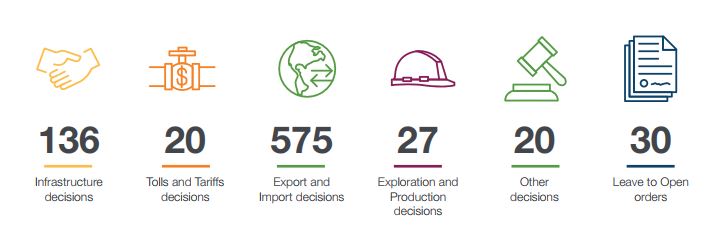Delivering Regulatory Stability During the Pandemic
In its first full year in operation, the Commission delivered regulatory stability during the global COVID-19 pandemic. Indeed, no one could have foreseen the impacts the pandemic would have on regulatory organizations like the CER, nor on the adjudicative processes they deliver. The Commission quickly adapted its adjudicative proceedings to deal with this unprecedented and unexpected challenge.
The Commission prioritized keeping people safe by adjusting its processes, replacing in-person hearings with alternative formats – such as written or virtual proceedings – to allow participants to fully adhere to applicable public health measures. Revised and flexible processes allowed the Commission to operate in a fair, efficient, transparent and accessible manner, while also respecting the open-court principle. This allowed the Commission to continue making timely decisions while keeping safe everyone who relied on and participated in its proceedings.
The Commission acknowledges and values the diversity of cultural practices held by Indigenous peoples and in the spirit of Reconciliation, continued its work to support the meaningful participation of Indigenous peoples in its proceedings. Ceremony is an integral part of Commission processes, and so are adaptations to procedures such as providing Indigenous participants the option of being affirmed using an Eagle feather or another sacred object, if preferred, prior to the start of a testimony.
When making decisions pursuant to the CER Act, the Commission considers Indigenous knowledge and the impact of projects on the rights and interests of Indigenous peoples.
The CER Act clearly outlines the requirement for the CER’s regulatory system to enhance Canada’s global competitiveness. In service of that objective, the Commission delivered regulatory certainty and predictability by providing timely updates on how adjudicative processes would be adjusted in response to the pandemic. Additionally, the Commission made decisions in a timely manner, within established service standards and legislated time limits.
Revised and flexible processes allowed the Commission to operate in a fair, efficient, transparent and accessible manner, while also respecting the open-court principle.
The importance and value of maintaining ongoing and strong relationships with other federal, provincial, and territorial regulators about how adjustments were being made nationwide to adjudicative and regulatory processes was highlighted during this time. The Commission not only participated in a regular dialogue amongst regulators about new and ongoing pandemic impacts to processes and related adjustments, but also continued its work of organizing and hosting virtual conferences, webinars, presentations and other educational offerings with CAMPUT, Canada’s Energy and Utility Regulators Association, as well as NARUC, the United States’ National Association of Regulatory Utility Commissioners, during the pandemic.
In 2020-21, the Commission also identified and advanced priority areas for improvements in the way it operates. For example, the Commission established a Learning System to help facilitate its professional development. It also established quarterly regulatory meetings with senior CER management to provide opportunities for interaction on matters of strategic importance for the CER, outside of specific adjudicative files. These activities helped foster a culture of learning and continuous improvement for the Commission and the organization as a whole. Such initiatives have been integrated into the CER’s Strategic Plan in alignment with the rest of the organization.
Over the course of 2020-21, Commissioners adjudicated hundreds of applications for pipelines, powerlines, tolls and tariffs, export and import licences, financial resources assessments and condition compliance matters that span the lifecycle of energy infrastructure. Over the past year, the Commission issued 136 infrastructure decisions and more than 200 decisions related to post-approval matters as explained in Appendix G. This is a significant increase over the infrastructure decisions in the year prior, principally on account of the detailed route hearings and right of entry orders issued on the Trans Mountain Expansion Project. The Commission also released 20 decisions on tolls and tariffs.
Additionally, the Commission issued 575 licences related to the export and import of hydrocarbons. There were 27 decisions issued related to exploration and production. The Commission also granted 30 leave to open orders and then 20 miscellaneous decisions were issued that did not fit into the categories listed above.
A comprehensive list of Commission adjudicative activities is provided in the appendices section of this report.
To learn more about work in 2020-21 of the CER as a whole, please see the 2020-21 Annual Report of the Canada Energy Regulator.


